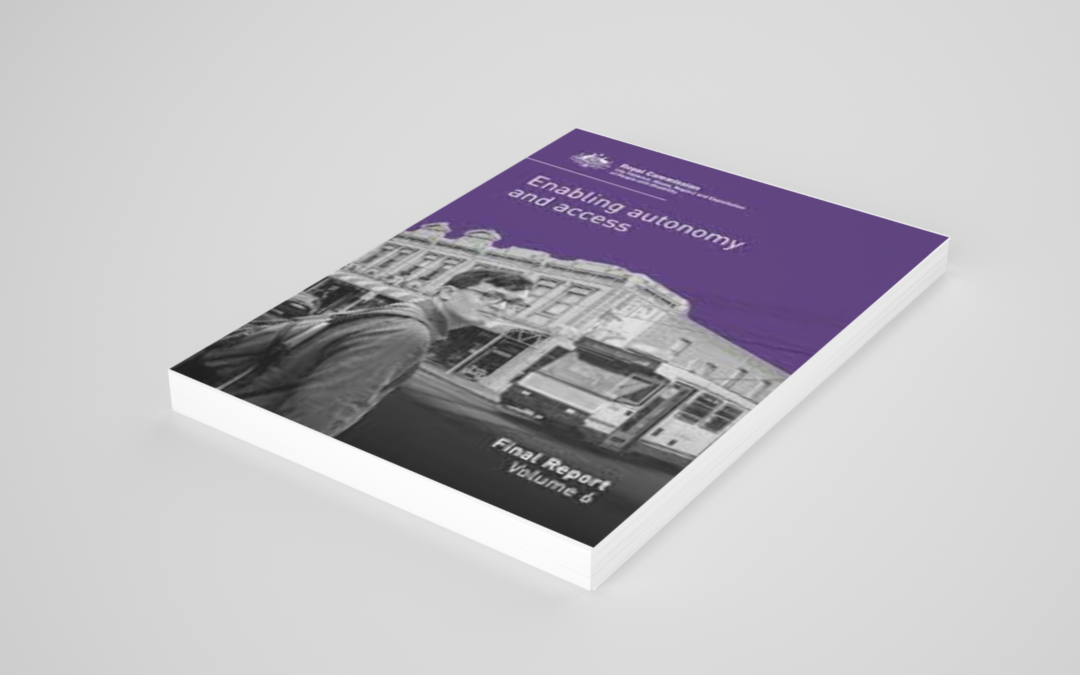This week, we continue our analysis of the Final Report on the Disability Royal Commission (DRC), with our focus turning to the recommendations relating to restrictive practices.
Many people with disability and advocates have looked to the Disability Royal Commission (DRC) for a clear direction on eliminating restrictive practices.
Restrictive practices are anything that ‘has the effect of restricting the rights or freedom of movement of a person with disability.’ This overwhelmingly happens to people with an intellectual disability, autistic people and people with psychosocial disability. They happen at school, at home, in disability providers, in prison, in hospitals.
The Disability Royal Commission heard evidence of a range of violence against people with disability such as support staff turning power off from an electric wheelchair, sedating people with huge doses of medication, and the involuntary sterilisation of men and women for ‘convenience’. The same paper found that First Nations people with disability experience more of this kind of abuse.
DRC recommendations for restrictive practices
So what has the Royal Commission said should happen in Volume 6?
- Recommendation 6.35 outlines what the DRC believes should be the ‘legal frameworks for the authorisation, review and oversight of restrictive practices’.
- Recommendation 6.36 talks about immediately stopping certain restrictive practices.
- Recommendation 6.37 is about collecting more data and public reporting on psychotropic medication.
- Recommendation 6.38 says there needs to be strengthening of the evidence base on reducing and eliminating restrictive practices.
- Recommendation 6.39 is about improving collection and reporting of restrictive practices data.
- Recommendation 6.40 calls for targets and performance indicators to drive the reduction and elimination of restrictive practices as though this will help.
- Recommendation 6.41 asks for the legislative prohibition of non-therapeutic sterilisation.
The first recommendation talks about the legal framework that allows this abuse to occur. This framework is managed at the state and territory level of government, except for the national NDIS Restrictive Practice Rules that also apply to NDIS registered providers. NSW and Western Australia currently don’t have legislation, while the ACT, NT, Queensland, SA, Tasmania and Victoria do. (NSW does have an exposure draft from 2021.)
Crucially, none of the recommendations call for the elimination of restrictive practices, nor outline a path to ending them. The last review of Australia’s compliance with the Convention on Rights of Persons with Disabilities which said the UN was concerned about:
‘Legislation, policies and practices that permit the use of psychotropic medications, physical restraints and seclusion under the guise of “behaviour modification” and restrictive practices against persons with disabilities, including children, in any setting, including in justice, education, health, psychosocial and aged care facilities’.
While the recommendations about better data collection and reporting are welcome, this has not been a deterrent for NDIS providers, who continue to report huge amounts of restrictive practices to the NDIS Commission. In October to December 2022, there were 410,657 incidents, and 439,322 in the following quarter.
The management of the regulations continue to rely on people with disability and their families, supporters and advocates making complaints and in the case of the NDIS, the Quality and Safeguards Commission regulating behaviour management plans.
This list of restrictive practices that the DRC agrees in recommendation 6.36 should be prohibited makes for sobering reading for anyone who followed the Royal Commission or watched the recent Four Corners. While having this list is important, without a clear direction and movement towards elimination, this legal violence against people with disability will continue.
Further analysis
We are working on further analysis of key topics for the disability advocacy sector in the recommendations of the final report. We will post with more analysis shortly.

